#Russian Federal Penitentiary Service
Explore tagged Tumblr posts
Text
If this is true (and, unfortunately, it looks like it is), it means the world has witnessed another crime of Putin and his regime.
I wish Alexey would live to see Putin in the international criminal court...
60 notes
·
View notes
Text
of course, some of this isn't understandable because I put it through google translate.
but still, the dehumanization evident is shocking.
we hear of this, but to hear from one person who has gone through it--
(I haven't even watched this but just the description is horrific)
we know some of what's going on, but we need to know more. THIS MUST STOP
russia has totally fallen into barbarism and cruelty.
from gulagu.net:
00:01:30 Video 18+ providing medical assistance to a Ukrainian from the hospital after being released from captivity (clearly - injuries from torture and holes in the legs);
00:04:00 About how bound prisoners were thrown from the KAMAZ, tortured and shot
00:08:50 How the military from the Russian Federation were going to rape the prisoner
00:14:15 Aleksey Anulya before and after captivity. Photofact
00:16:00 About how dad Alexei was killed
00:31:00 About how wounded Ukrainians are mocked
00:48:30 About seconded sadists from different DOS UFSIN
00:51:20 Special forces "nailed it hard"
00:54:00 About how the FSB and the Federal Penitentiary Service recruit prisoners
00:54:45 Federal Penitentiary Service: “Did your mother beat you as a child? And she beat me!”
00:58:00 About how special forces beat captive women
01:04:00 About torturing naked prisoners in a bathhouse with electric shocks and not only
01:09:50 About how the concentration camp nurse hated Ukrainians
01:13:20 How the Federal Penitentiary Service "painted eggs" on Easter, beat the prisoners and broke their ribs
01:14:25 About how the prisoners were put food into the bowl of the service dog of the Federal Penitentiary Service
01:18:15 About how sadists tried to rape captive women
01:38:45 How soldiers of the Armed Forces of Ukraine were carved on the cheek Z
01:42:30 About the position in which prisoners were forced to stand for 17 hours a day
01:45:15 About torture, tapik, electric current and heart burn
01:50:00 Everywhere in concentration camps there are portraits of Dzerzhinsky - the "leader of torture"
01:56:20 Nurse about torture: “They are not beaten - they are taught about their lives!”
01:56:50 About how the FSB tortures during interrogations
02:10:30 Soldering in the punishment cell - 2 tablespoons of cut. Starvation torture for 4 months
02:21:40 About torture by sleep deprivation
02:24:30 Ex-prisoner Aleksey Anulya about how he ate a worm to survive
02:29:15 After hitting the door with a stick, the prisoners should yell "Zelensky pi___ras, Biden pi___ras, Stoltenberg pi___ras, Putin is our president!"
03:10:00 How a ghost saved a prisoner
03:11:10 How to close your eyes so that they do not fly out from the blows of the sadists from the Federal Penitentiary Service
03:13:00 How I ate a rat to survive
03:18:40 What is a “tapik” and about 2 types of electric current used to torture captured Ukrainians
03:22:00 Testimony about “white pipes” (know-how of sadists so as not to break the special equipment of the PR - rubber sticks, the Federal Penitentiary Service now beat prisoners with pipes for water supply)
youtube
49 notes
·
View notes
Text
How Russia sent prisoners to war with no contracts, no injury compensation, and no military serviceman status
The Russian Defense Ministry recruited former inmates to fight in the invasion of Ukraine based only on “written agreements” that did not constitute legal contracts, according to a new investigation from BBC News Russian. The report cites more than 20 Russian court rulings issued in suits filed by former inmates and their families over the authorities’ refusal to issue compensation payments for the men’s injuries or deaths.
Among these court decisions, journalists found previously classified information referring to “special contingent volunteers” who fought in “Storm Z” units, Russia’s assault formations made up primarily of prisoners. According to the BBC, the terms of these former inmates’ service were set by special classified orders, rather than by the rules governing most other combatants’ employment. The military recruited prisoners to serve in these “special contingents” between February 24 and September 1, 2023, and they were sent to the war for six-month terms in exchange for presidential pardons.
What was the ‘legal’ basis for this program?
According to the documents reviewed by BBC, Putin issued a decree calling for the Defense Ministry to develop a new procedure for selecting inmates to carry out “particularly important combat missions and special tasks” in February 2023. According to one court ruling, the entire project, including the creation of “Storm Z” units, fell under a program called “For Freedom” (stylized as “Za сVободу” in Russian).
Were these former inmates classified as soldiers, mercenaries, or something else?
Members of the “special contingent” were not granted the formal status of military serviceman; multiple court rulings specify that they took part in the war “under special conditions.” Judges indicated in their decisions that the “legal nature” of the Storm Z squads “differs from that of an [ordinary] volunteer formation” and that the units don’t fall under the article on volunteer formations in Russia’s law “On Defense.”
How did the enlistment process work?
After being recruited, prisoners in the “special contingent” were transferred to a prison in Russia’s Rostov region, near the Ukrainian border, where they reportedly signed “written agreements” under the supervision of state officials.
In these documents, the former prisoners indicated that they “expressed their consent” to participate in the war “with the aim of atoning for their guilt before society for the crime they committed.” One of the court decisions reviewed by BBC notes that the “agreement in question does not constitute a contract laying out the rights and liabilities of each party.”
According to the investigation, Russia’s Federal Penitentiary Service attached one copy of the “agreement” to each convict’s personal file and sent a second copy to the Defense Ministry; the former prisoners themselves were not given copies of their own.
Why weren’t these former prisoners compensated for injuries?
In 2023, the Russian Defense Ministry released a decree establishing “separate [...] rules regulating salaries and additional payments” for ex-prisoners, according to court documents. These rules call for former inmates’ salaries to be two to four times smaller than the salaries of combatants in other categories, though it entitles their families to death compensation payments equivalent to those of other fighters.
Members of the “special contingent,” however, were not granted any of these benefits, including both disability and death payouts. One court document explains that this is because they were “not entitled to the compensation payments laid out by Putin in his 2022 decree.” The same document also indicates that the decision on whether to send injured fighters from the “contingent” back into combat after their hospitalization was made by assault unit commanders rather than medical workers.
Did any of these former inmates or relatives win their lawsuits?
The BBC was able to find only one case of a court siding with a former “special contingent” member seeking compensation for an injury. The case involved a man from the Rostov region who was serving a nine-year prison sentence before going to the front, where he was wounded by a landmine. The court awarded him 600,000 rubles ($6,451), though the Rostov regional authorities have appealed the decision.
4 notes
·
View notes
Text
🇺🇸⚔️🇷🇺 🚨
U.S. PRESIDENT BIDEN SLAMS RUSSIAN PRESIDENT PUTIN AFTER FAR RIGHT-WING RUSSIAN ACTIVIST ALAXEI NAVALNY'S DEATH IN RUSSIAN PRISON
📹 🤡 U.S. Great-Grandfather and Clown in Chief President Joe Biden slams Putin over the death of Far Right-wing political activist Alexei Navalny's death in a Russian prison, using his death as an opportunity to call for more funding for Kiev's failing war in the east of the country.
The U.S. President had nothing to say about the death of the American and Chilean journalist, Gonzalo Lira, in a Ukrainian prison just weaks ago, even after publishing videos earlier in the year begging the U.S. government to intervene before he was tortured to death. Sadly, he died as a result of untreated pneumonia in a Ukrainian prison hospital.
Alexei Navalny, though supported by Western governments and raised up as an "anti-corruption" activist, especially by the United States, was known in Russia as a self-described "certified nationalist" who called Muslims "flies and cockroaches" who needed to exterminated.
Navalny was serving a prison sentence of 19 years for offenses involving "extremism", with some early sources saying he died from a blood clot, losing consciousness after taking a walk and found by prison staff soon after. Prison medical doctors pronounced Navalny dead after arriving soon after.
Kremlin spokesperson, Dimitry Peskov told reporters Friday that medical personnel with Russia's Federal Penitentiary Service (FSIN) are "taking all the steps that need to be taken in such a situation," adding that medical personnel with the FSIN were investigating Navalny's cause of death and will inform the Russian President of their results.
#source1
#source2
#videosource
@WorkerSolidarityNews
#alexei navalny#russia#russia news#russian news#russian politics#united states#us president#president joe biden#joe biden#us foreign policy#us imperialism#us propaganda#us media#us news#us politics#politics#news#geopolitics#world news#global news#international news#europe#eastern europe#europe news#european news#western propaganda#western imperialism#biden administration#biden#us contradiction
7 notes
·
View notes
Text
Russian authorities are using torture “with a sense of impunity” in the ongoing war in Ukraine, the UN Human Rights Council in Geneva heard on Monday. In an oral update to members, Erik Møse, chair of the Commission of Inquiry on Ukraine, said it has documented new cases of torture committed by Russian authorities against civilians and prisoners of war in occupied areas of Ukraine and in the Russian Federation. “We gathered evidence of sexual violence used as torture, mainly against male victims in detention, and of rapes targeting women in villages under Russian control,” he said. “The wide geographic spread of locations where torture was committed and the prevalence of shared patterns demonstrate that torture has been used as a common and acceptable practice by Russian authorities, with a sense of impunity,” he added. Consistency and coordination The three-member Commission was established roughly a week after the start of the full-scale Russian invasion of Ukraine on 24 February 2022. It has previously highlighted how torture committed by Russian authorities has been both widespread and systematic. Mr. Møse said recent investigations show that Russian authorities have committed torture in Ukrainian regions under Russian control, thus reinforcing the finding that torture has been widespread, while additional common elements uphold that it has been systematic. “One element is the consistency of practices in detention centres where detainees from Ukraine have been held in the Russian Federation, and the replication of these practices in several large penitentiary centres in occupied areas of Ukraine,” he said. “Another common element emerging from the evidence points towards a coordinated use of personnel from specific services of the Russian Federation who are involved in torture in all the detention facilities investigated by the Commission. A further common feature is the recurrent use of sexual violence as a form of torture in almost all these detention centres.”
The Commission also cited the testimonies of former detainees who said prison staff in the Russian Federation referred to orders to inflict brutal treatment. Furthermore, in some facilities higher ranking authorities ordered, tolerated or took no action towards stopping it. “For instance, in a detention centre in occupied territories of Ukraine, a witness described the arrival of a penitentiary official from the Russian Federation who introduced himself to the detainees, stating, ‘I broke everyone and will do the same to you’”, said Mr. Møse. He noted that “a disturbing factor” reported in many detention facilities was the lack of adequate medical assistance. “In one facility, even penitentiary doctors participated in the torture,” he added.
https://news.un.org/en/story/2024/09/1154706
#ukraine#russia#russian invasion of ukraine#torture#prisoners of war#war crimes#prosecute russian war criminals
2 notes
·
View notes
Text
Urgent Action: STOP THE INHUMANE TREATMENT OF MARIA PONOMARENKO IN PRISON (Russia 33.24)
The Russian authorities are putting the health and life of journalist Maria Ponomarenko at risk due to her treatment, and the conditions in detention, including being held in solitary confinement and not receiving adequate healthcare. Maria was sentenced to six years imprisonment solely for exercising her right to freedom of expression and must be released immediately and unconditionally.
Since her arrest in 2022 there have been multiple reports of her ill-treatment and arbitrary punishment in custody in IK-6 (Shipunovo) and SIZO-1 and SIZO-2 in Barnaul, including:
Forced psychiatric treatment, including administration of unknown drugs; Provision of ill-fitting shoes ahead of a disciplinary hearing; Disruptions in provision of medication; Confiscation of authorized goods and groceries by Federal Penitentiary Service staff; Threats by Federal Penitentiary Service staff to deprive Maria of phone calls with her family; Repeated placement in solitary confinement.
Maria suffers from claustrophobia and other mental health conditions and cannot safely be placed in solitary confinement. During her previous placement in a punishment cell her mental health deteriorated, and she attempted suicide
TAKE ACTION:
Write a letter in your own words or using the sample below as a guide to one or both government officials listed. You can also email, fax, call or Tweet them.
Click here to let us know the actions you took on Urgent Action 33.24. It’s important to report because we share the total number with the officials we are trying to persuade and the people we are trying to help.
3 notes
·
View notes
Text
Details: The human rights defenders posted the testimony of two former commanders of the Wagner private military company units, who were recruited to join Yevgeny Prigozhin's mercenaries from the Russian colonies.
They are Azamat Uldarov, a former convict of Correctional Labour Colony №13 of the Russian Office of the Federal Penitentiary Service from Saratov Oblast (pardoned by the decree of the President of the Russian Federation from 23 August 2022) and Alexei Savichev, a former convict of the Corrective labour colony №1 of the Russian Office of the Federal Penitentiary Service from Voronezh Oblast (pardoned by Putin's decree from 2 September 2022).
The criminals are currently in Russia.
During the week, they testified during video and audio interviews and informed Vladimir Osechkin, the Gulagu.net founder, about the details of the shooting of more than 20 Ukrainian children and teenagers, the blowing up of a pit with more than 50 wounded prisoners and the so-called "500" (those who decided to stop fighting and refused to carry out orders to kill Ukrainians), clearing residential buildings and killing everyone, including children.
In particular, one of the Wagnerites admits that he "shot a 5-year-old girl in the head" when they went to Soledar and Bakhmut: "She screams, she is a small child, you understand. I shot a 5-6-year-old girl in the head."
Uldarov said that he "cleared" the basement with 300-400 civilians; about 40 of them were children. According to him, it was a 9-story building. The occupier adds that "he had no choice" and that he had an order to dispose of everyone.
Quote from Uldarov: "I executed the order with this very hand, I killed the children. You understand, by order. The fact that we… We were given the order to wipe out and kill everyone… We went and killed everyone – women, men, pensioners and children, in particular, the small ones, 5 year-olds."
According to the terrorists, a command to mop up Bakhmut came from Prigozhin. He ordered not to spare anyone – neither old people nor children, just to kill them all. It was even worse in Soledar.
Uldarov also said that he "cleared" the basement of a 9-story building in Bakhmut with 300-400 civilians inside, including 40 children. The occupier adds that "he had no choice" and that he had an order to kill everyone.
The terrorist stated that it happened in March 2023.
Quote from Savichev: "Peaceful residents were going outside. And there was an order: everyone aged 15 and over – shoot all of them at once. 20–24 people were shot, 10 of them were 15-year-old and 17-year-old teenagers."
Asked how many unarmed civilians they killed in February 2023, Savychev replied that 15-year-old Ukrainians "are difficult to call civilians."
Both former commanders of the units of the Wagner private military company units also said that Prigozhin personally gave criminal orders to execute people, approving terrorist methods and brutality.
cannot begin to express how asinine it is to call people “warmongers” because they think it is right to support people resisting these kinds of atrocities with force of arms
21 notes
·
View notes
Text
«Не погиб. Убит». В Белграде сербы и русские вместе идут в колонне с лоз...
youtube
An action against Putin began in the center of Belgrade after the news of the murder of oppositionist Alexei Navalny in the torture chamber of IK-3 of the Federal Penitentiary Service of Russia in the Yamal-Nenets Autonomous Okrug. Serbs and Russians march together in a column with the slogans “Russia without Putin.”
Video filmed by a Gulagu.net volunteer
3 notes
·
View notes
Link
سجناء يحتجزون موظفين رهائن في سجن روسي.. ومقتل واحد على الأقل من الحراس https://sawtelghad.net/109775?feed_id=14268&_unique_id=66c87c51c9e83
0 notes
Text
Security forces 'kill' IS hostage takers in Russian detention centre
Russian security forces stormed a detention centre in southern Russia on Sunday killing inmates who had taken two members of staff hostage, Russian state news agency RIA Novosti reported on Sunday. The hostages at the pretrial detention centre in Rostov-on-Don were uninjured, said RIA Novosti, citing Russia’s Federal Penitentiary Service. It said that the hostage takers had been “liquidated,”…

View On WordPress
0 notes
Text
Might True Religion be Religionless?
FILE – Russian opposition leader Alexei Navalny is seen on a TV screen as he appears in a video link provided by the Russian Federal Penitentiary Service from the colony in Melekhovo, Vladimir region, during a hearing at the Russian Supreme Court in Moscow, Russia, on June 22, 2023. The Kremlin on Tuesday Dec. 12, 2023 bristled at the U.S. voicing concern about Navalny who has vanished from his…

View On WordPress
#700Club#Barmen_Declaration#Bonhoeffer#Buchenwald#Christianity#consequences#death#ethics#faith#Flossenburg#Germany#Hitler#honesty#Hooton#hope#Jewish#justice#life#memories#morality#Munchen#navalny#Nazis#other#Putin#religion#Russia#Sotirin#SS#Sullivan
0 notes
Text
Over 400 detained in Russia as country mourns the death of Alexei Navalny, Putin's fiercest foe
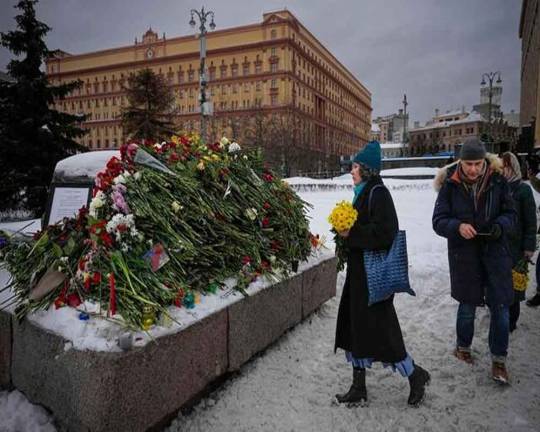
Over 400 people were detained in Russia while paying tribute to opposition leader Alexei Navalny, who died at a remote Arctic penal colony, a prominent rights group reported.
The sudden death of Navalny, 47, was a crushing blow to many Russians, who had pinned their hopes for the future on President Vladimir Putin's fiercest foe. Navalny remained vocal in his unrelenting criticism of the Kremlin even after surviving a nerve agent poisoning and receiving multiple prison terms.
The news reverberated across the globe, and hundreds of people in dozens of Russian cities streamed to ad-hoc memorials and monuments to victims of political repressions with flowers and candles on Friday and Saturday to pay a tribute to the politician. In over a dozen cities, police detained 401 people by Saturday night, according to the OVD-Info rights group that tracks political arrests and provides legal aid.
More than 200 arrests were made in St Petersburg, Russia's second largest city, the group said. Among those detained there was Grigory Mikhnov-Voitenko, a priest of the Apostolic Orthodox Church — a religious group independent of the Russian Orthodox Church — who announced plans on social media to hold a memorial service for Navalny and was arrested on Saturday morning outside his home.
He was charged with organising a rally and placed in a holding cell in a police precinct, but was later hospitalised with a stroke, OVD-Info reported.
Courts in St Petersburg have ordered 42 of those detained on Friday to serve from one to six days in jail, while nine others were fined, court officials said late on Saturday. In Moscow, at least six people were ordered to serve 15 days in jail, according to OVD-Info. One person was also jailed in the southern city of Krasnodar and two more in the city of Bryansk, the group said.
The news of Navalny's death came a month before a presidential election in Russia that is widely expected to give President Vladimir Putin another six years in power. Questions about the cause of death lingered on Sunday, and it remained unclear when the authorities would release his body to his family.
Navalny's team said Saturday that the politician was “murdered” and accused the authorities of deliberately stalling the release of the body, with Navalny's mother and lawyers getting contradicting information from various institutions where they went in their quest to retrieve the body. “They're driving us around in circles and covering their tracks,” Navalny's spokeswoman, Kira Yarmysh, said on Saturday.
“Everything there is covered with cameras in the colony. Every step he took was filmed from all angles all these years. Each employee has a video recorder. In two days, there has been not a single video leaked or published. There is no room for uncertainty here,” Navalny's closest ally and strategist Leonid Volkov said Sunday.
A note handed to Navalny's mother stated that he died at 2:17 pm Friday, according to Yarmysh. Prison officials told his mother when she arrived at the penal colony Saturday that her son had perished from “sudden death syndrome,” Ivan Zhdanov, the director of Navalny's Anti-Corruption Foundation, wrote on X, formerly known as Twitter.
Russia's Federal Penitentiary Service reported that Navalny felt sick after a walk Friday and became unconscious at the penal colony in the town of Kharp, in the Yamalo-Nenets region about 1,900 km (1,200 miles) northeast of Moscow. An ambulance arrived, but he couldn't be revived, the service said, adding that the cause of death is still “being established.”
Source : Over 400 detained in Russia as country mourns the death of Alexei Navalny, Putin's fiercest foe
#English News Paper#Breaking News#Latest Today News in English#News Headlines India#400 people were detained in Russia#Alexei Navalny
1 note
·
View note
Text
Alexei Navalny, Russian politician who opposed Putin to the end, has died in prison
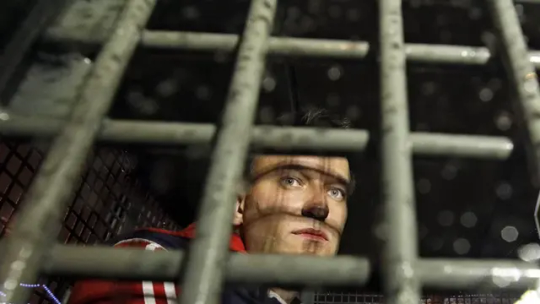
Full VIDEO
MOSCOW — Alexei Navalny, Russia's most prominent political opposition figure, has died in a remote Russian prison at age 47.News of Navalny's death came Friday from the Federal Penitentiary Service in the Yamalo-Nenets Autonomous District, above the Arctic Circle.
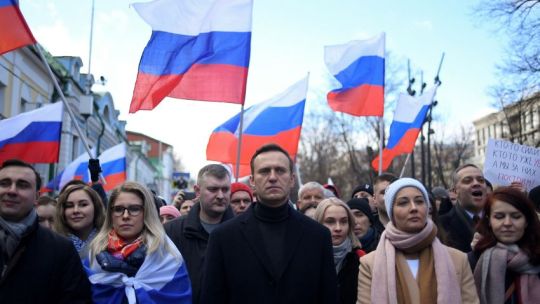
Full VIDEO
Munich, GermanyCNN — The what is known, but the how may never be clear. It is the why that is already the largest question, after the untimely death of Alexey Navalny. We don’t know whether the Kremlin had a hand in his death, but they certainly failed in their duty of care of their most famous prisoner.
Full VIDEO
1 note
·
View note
Text
New reporting from The Wall Street Journal details how Igor Potapenko, the head of Russia’s Federal Penitentiary Service for St. Petersburg and the Leningrad region, ordered guards to subject Ukrainian prisoners of war to particularly brutal treatment from the very first weeks of the full-scale invasion.
Citing former prison officials and former prisoners, the newspaper reports that Potapenko instructed an elite unit of guards to “be cruel” to POWs and to “[not] pity them.”
These orders were part of a system created specifically for Ukrainians captured in the war, according to WSJ. The new policies, which were also implemented in other regions, removed body cameras and lifted official restrictions on the use of violence.
Ultimately, these measures paved the way for “nearly three years of relentless and brutal torture,” the paper reports. This included guards subjecting prisoners to prolonged electric shocks to their genitals, beating them while “experimenting” with different materials to maximize harm, and withholding medical treatment, allowing gangrene to progress until amputations were necessary.
The officials who spoke to WSJ reportedly entered a witness protection program after testifying to investigators from the International Criminal Court and are now living in undisclosed locations.
2 notes
·
View notes
Text
Western leaders have held Vladimir Putin directly responsible for the death of the Russian opposition leader Alexei Navalny, as the US president, Joe Biden, called it “yet more proof of Putin’s brutality”.Navalny, 47, died while being held in a jail about 40 miles north of the Arctic Circle, where he had been sentenced to 19 years under a “special regime”.“Make no mistake, Putin is responsible for Navalny’s death,” Biden said in remarks from the White House on Friday.The death of Navalny, once Putin’s most significant political challenger, is a watershed moment for Russia’s shattered pro-democracy movement, which has largely been jailed or driven into exile since the Ukraine invasion of 2022. Though Navalny and his many supporters expected he could die behind bars, few thought it would be so soon. Reports of his death sent a shockwave of anger and disbelief through the ranks of his supporters, including his family.“I don’t know whether to believe the terrible news,” his wife, Yulia, said during a speech at the Munich Security Conference. “But if it is true, then I would like Putin, his staff, his friends, his government, to know that they will be punished for what they’ve done with our country, my family and my husband. They will be brought to justice, and that day will come very soon.”Navalny’s death raises questions about what tools the west still has to constrain or punish Putin, who has faced sanctions since 2022 and has been indicted by the international criminal court for the abduction of Ukrainian children.Biden in 2021 promised “devastating” consequences for Russia if Navalny were to die behind bars. However, it is not clear what could restrain Putin from a further crackdown on Navalny’s supporters in Russia and abroad.In his remarks, Biden praised Navalny’s courage and his decision to return to Russia despite facing near-certain imprisonment. “He bravely stood up to the corruption, the violence and all the bad things that the Putin government was doing,” Biden said. “In response, Putin had him poisoned, he had him arrested, he had him prosecuted for fabricated crimes, he sentenced him to prison, he held him in isolation … Even in prison he was a powerful voice for the truth.”Russia has claimed Navalny died of natural causes. In a statement, the federal penitentiary service for the region where Navalny was incarcerated said he “felt unwell after a walk and almost immediately lost consciousness”.“All necessary resuscitation measures were carried out but did not yield positive results,” the statement said. “The paramedics confirmed the death of the convict.” The Kremlin said Putin had been informed but had no further information.Western reaction was swift, as top officials from the US and Europe accused the Kremlin of causing Navalny’s death. The Foreign Office summoned the Russian embassy in London, adding “we hold the Russian authorities fully responsible.” The US secretary of state, Antony Blinken, said: “His death in a Russian prison and the fixation and fear of one man only underscores the weakness and rot at the heart of the system that Putin has built. Russia is responsible for this.”Putin’s press secretary, Dmitry Peskov, responded angrily, calling western leaders’ remarks “absolutely outrageous and absolutely unacceptable”.In Moscow, St Petersburg and other cities across Russia, small groups of Russians braved strict anti-protest laws and laid flowers at makeshift memorials to Navalny. More than 100 people were arrested, according to OVD-Info, a Russian rights group that tracks political arrests and offers legal aid.Navalny had looked healthy when he appeared by video for a courtroom appeal on Thursday. Speaking from prison, he had complained about the frequent fines he had received while in a punitive cell and asked the judge to send him some money “as my own is running out thanks to your decisions”. The cause of death had not been established, the penitentiary service said. Last year Navalny was treated in hosp...

View On WordPress
0 notes
Text
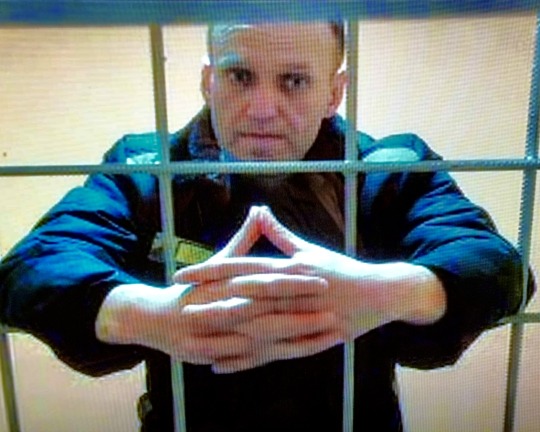
Russian opposition leader Alexei Navalny fell unconscious and died on Friday after a walk at the IK-3 "Polar Wolf" Arctic penal colony where he was serving a three-decade sentence.
(Video-link photo: Russian Federal Penitentiary Service)
Putin critic Alexei Navalny dead, says Russia’s prison service
US President Joe Biden has led the world’s condemnation of Russian President Vladimir Putin following reports his jailed political rival has died in an Arctic penal colony.
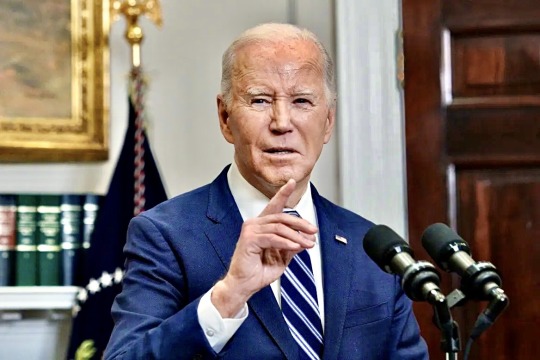
US President Joe Biden speaks on the death of Alexey Navalny, Russian opposition leader, in the White House. (Photo: Bloomberg)
Alexei Navalny, aged 47 years, a fierce anti-corruption campaigner who galvanised Russia’s political opposition, collapsed after a walk at his prison on Friday after which, prison services said, he lost consciousness and couldn’t be revived.
Biden said he was both “not surprised and outraged at the news”, adding Navalny had bravely fought the regime during Russia’s slow descent into authoritarianism under Putin.
“Even in prison, he was a powerful voice for the truth,” Biden said. “Make no mistake: Putin is responsible for Navalny’s death. What has happened to Alexei Navalny is more proof of Putin’s brutality.”

Alexei Navalny was arguably Vladimir Putin’s fiercest critic. (Photo: AP)
In an unplanned appearance at the Munich Security Conference, Alexei Navalny’s wife Yulia Navalnaya said that Putin would “bear responsibility” for what he had done.
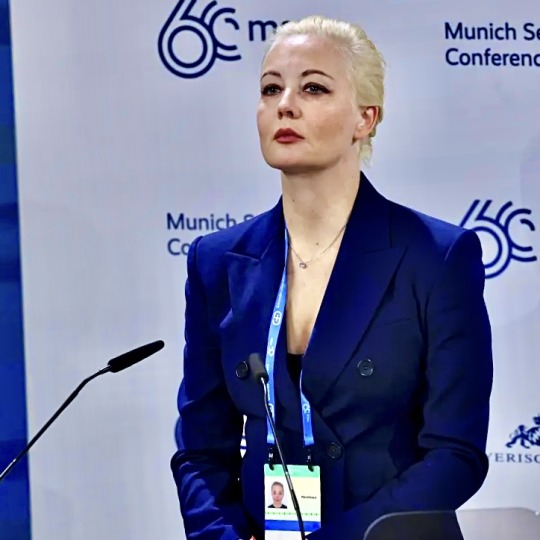
Yulia Navalnaya, wife of Russian Alexei Navalny, speaks during the Munich Security Conference. (Photo: AP)
By Rob Harris
The Age & Sydney Morning Herald - February 16, 2024
•
•
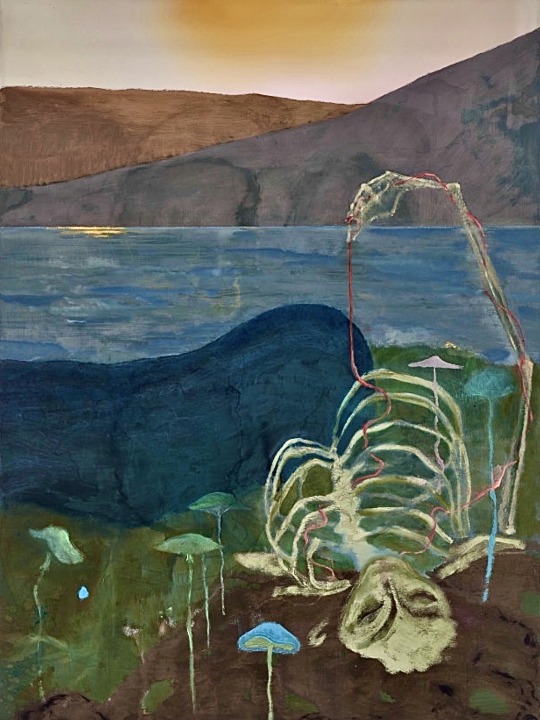
Sanya Kantarovsky (Russian, 1982, active in the USA), Charnal Field, 2022. Oil on canvas, 75 x 55 ¼ in.
Reblogged (link copied) from thunderstruck9 via Tumblr, with thanks.
In memory of Alexei Navalny RIP
Sic transit gloria mundi
•
•
Bandcamp audio music track >> Never Were the Way She Was - From the collaborative album by Colin Stetson / Sarah Neufeld Duo [Released 28 April 2015 - Constellation Records / 8mins.+12secs.]
Reblogged (link copied) from nobodysugly via Tumblr, with thanks.
In memory of Alexei Navalny RIP
Sic transit gloria mundi
•
•
YouTube audiovisual music track >> Pink Sea - Yume Nikki - Dream Diary - OST [Released 25 February 2018 / 2mins.+56secs.]:
In memory of Alexei Navalny RIP
Sic transit gloria mundi
youtube
•
•

On Friday, Russian authorities said President Vladimir Putin’s key political challenger, Alexei Navalny, died in an Arctic prison colony. (Photo: AP)
Nerve agents, poison and window falls: Kremlin foes have been attacked or killed over the years
Assassination attempts against foes of Russian President Vladimir Putin have been common during his nearly quarter century in power.
The attacks range from the exotic — poisoned by drinking polonium-laced tea or touching a deadly nerve agent — to the more mundane of getting shot at close range. Some take a fatal plunge from an open window.
Over the years, Kremlin political critics, turncoat spies and investigative journalists have been killed or assaulted in a variety of ways.
By Associated Press
Nine News - February 17, 2024
•
0 notes